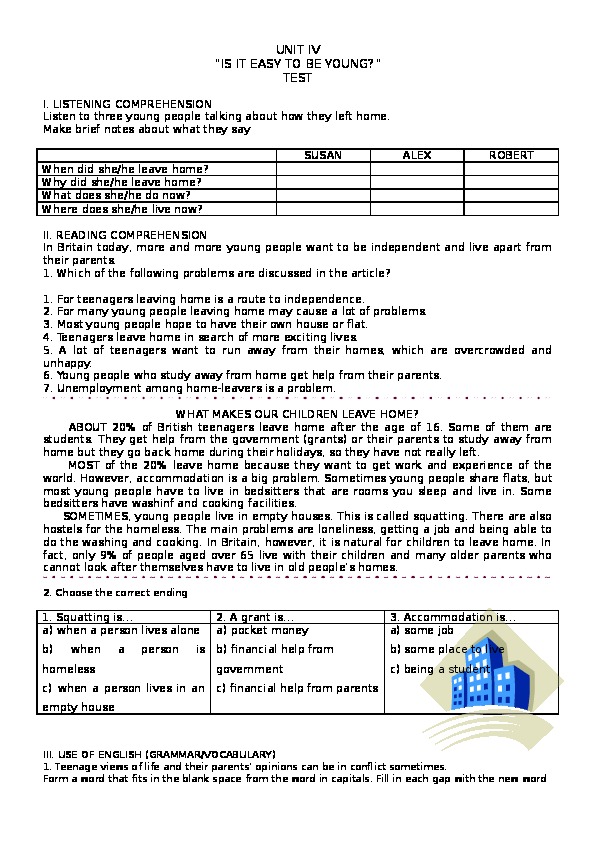“IS IT EASY TO BE YOUNG?”
UNIT IV
TEST
I. LISTENING COMPREHENSION
Listen to three young people talking about how they left home.
Make brief notes about what they say
When did she/he leave home?
Why did she/he leave home?
What does she/he do now?
Where does she/he live now?
SUSAN
ALEX
ROBERT
II. READING COMPREHENSION
In Britain today, more and more young people want to be independent and live apart from
their parents.
1. Which of the following problems are discussed in the article?
1. For teenagers leaving home is a route to independence.
2. For many young people leaving home may cause a lot of problems.
3. Most young people hope to have their own house or flat.
4. Teenagers leave home in search of more exciting lives.
5. A lot of teenagers want to run away from their homes, which are overcrowded and
unhappy.
6. Young people who study away from home get help from their parents.
7. Unemployment among home-leavers is a problem.
WHAT MAKES OUR CHILDREN LEAVE HOME?
ABOUT 20% of British teenagers leave home after the age of 16. Some of them are
students. They get help from the government (grants) or their parents to study away from
home but they go back home during their holidays, so they have not really left.
MOST of the 20% leave home because they want to get work and experience of the
world. However, accommodation is a big problem. Sometimes young people share flats, but
most young people have to live in bedsitters that are rooms you sleep and live in. Some
bedsitters have washinf and cooking facilities.
SOMETIMES, young people live in empty houses. This is called squatting. There are also
hostels for the homeless. The main problems are loneliness, getting a job and being able to
do the washing and cooking. In Britain, however, it is natural for children to leave home. In
fact, only 9% of people aged over 65 live with their children and many older parents who
cannot look after themselves have to live in old people’s homes.
2. Choose the correct ending
1. Squatting is…
a) when a person lives alone
b) when a person is
homeless
c) when a person lives in an
empty house
2. A grant is…
a) pocket money
b) financial help from
government
c) financial help from parents
3. Accommodation is…
a) some job
b) some place to live
c) being a student
III. USE OF ENGLISH (GRAMMAR/VOCABULARY)
1. Teenage views of life and their parents’ opinions can be in conflict sometimes.
Form a word that fits in the blank space from the word in capitals. Fill in each gap with the new wordSome adults admit that teenagers have a great deal of (1) ______ (INDEPENDENT) today.
Schools, the media and young people themselves place a lot of (2) _____ (IMPORTANT) on
being independent. The most popular topics for discussion chosen by teenagers are: part-
time job, parents’ reaction to boyfriends or girlfriends, and (3) _____ (VIOLENT).
Most British parents say that they would like to (4) _____ (PROTECTION) their children
until they reach 16.
A lot of adults (5) _____ (COMPLAINT) about teenage (6) _____ (AGGRESSIVE) and cruelty.
Schools and the media should give more information about the danger of alcohol (7)
_____ (ADDICT).
2. Below are some statements about what the parents forbid the teenagers to do.
For questions 1-7, read the following complaints. Choose the word which you think fits best to
complete each complaint. Fill in the gaps with the appropriate letters
1. My parents don’t let me _____ horror films. They say horror films are too violent.
2.
John’s father _____ him not to stay out late again.
3. Deborah’s father won’t _____ her drive his car.
4. My parents never allow me _____ parties at home.
5. My mum is very strict, so it will be difficult _____ her to buy me a motorbike. She
6. My parents want _____ to finish school first.
7. His parents never allowed him _____.
thinks I am too young.
1. a) to see
2. a) allows
3. a) forbid
4. a) to organize
5. a) to persuade
6. a) me
7. a) smoked
IV. CULTURAL AWARENESS
For statements 1-7, decide which of them are TRUE and which of them are FALSE. Tick the necessary
box
b) seen
b) orders
b) let
b) to let
b) to suggest
b) my
b) to smoke
c) see
c) lets
c) permit
c) to spend
c) to make
c) them
c) smoking
TRUE
FALSE
1.
2.
3.
4.
5.
6.
7.
In Britain you can’t get your ears pierced without your parents’
permission if you are 15.
In Britain you can get married before you can get a driving
licence.
In Britain you can’t buy fireworks until you are 16.
In Britain at the age of 13 you can’t go to prison.
In Britain you can’t buy a pet without your parents’ consent if you
are under the age of 12.
In Britain you are considered to be an adult when you are 17.
In Britain you can smoke at any age.
V. WRITING (HOME TASK)
VI. SPEAKING


